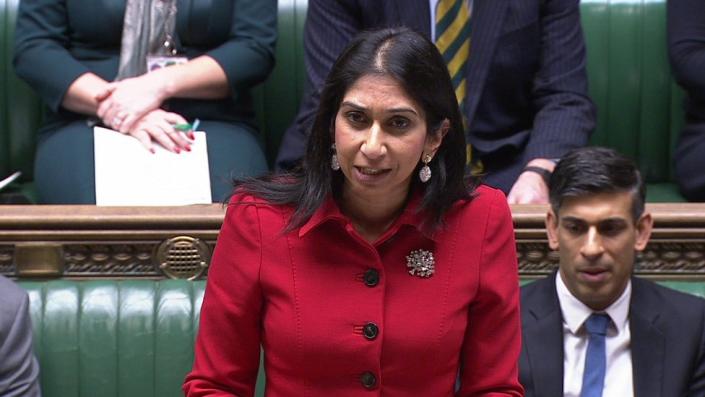How is the UK stopping Channel crossings and what are the legal routes to the UK?

The Illegal Migration Bill is facing fierce scrutiny in the House of Lords.
The bill is part of the government's plan to tackle small boat crossings after record numbers arrived in the UK this way in 2022.
What is the government's main plan to tackle migrants?
Under the Illegal Migration Bill, published at the beginning of March:
the home secretary has a duty to detain and remove those arriving in the UK illegally, either to Rwanda or another "safe" third country
migrants will not be granted bail or able to seek judicial review for the first 28 days of detention
under-18s, those medically unfit to fly or at risk of serious harm in the country to which they are being removed will be able to delay departure
people removed from the UK will be blocked from returning, or seeking British citizenship in future
the number of refugees the UK will settle through "safe and legal routes" is capped
The law will apply retrospectively, with anyone arriving illegally from Tuesday 7 March at risk of deportation.
What changes have been made to the Illegal Migration Bill in parliament?
Pressure from some MPs led to changes being made to the bill, known as "amendments".
One requires the government to produce a report looking at the existing so-called "safe and legal" routes to the UK, and the possibility of expanding them.

Another gives Home Secretary Suella Braverman the power - in certain circumstances - to ignore orders from the European Court of Human Rights (ECHR) to halt deportation flights.
Although the bill passed through the Commons, it still needs to be approved by the House of Lords.
During the Lords debate, Archbishop of Canterbury Justin Welby described the policy as "morally unacceptable", and said it risked damaging the UK's international reputation.
In response, Immigration Minister Robert Jenrick accused the bill's critics of failing to suggest alternative plans.
What are the "safe and legal" routes to claim asylum in the UK?
The Home Office insists there are a number of "safe and legal" routes to the UK.
However, some are only available to people from specific countries such as Afghanistan and Ukraine.
Other asylum routes only accept limited numbers:
UK Resettlement Scheme - prioritises those from regions in conflict. In 2022, 887 grants were made under this scheme
Community Sponsorship Scheme - for local community groups to provide accommodation and support for refugees. In 2022, 272 grants were made
Refugee Family Reunion - for partners and children under 18 of those already granted protection in the UK. In 2022, 4,473 people were granted visas
Mandate Resettlement Scheme - to resettle refugees who have a close family member in the UK who can offer a home. The scheme has resettled about 430 refugees since 2004, but just four people in 2022
On 26 April, Immigration Minister Robert Jenrick was asked in Parliament which safe and legal routes to the UK were available to a young person wanting to flee the conflict in Sudan.
He said "the best advice would be for individuals to present to the UNHCR [UN Refugee Agency]. We already operate safe and legal routes with them."
But the body insists "there is no mechanism through which refugees can approach UNHCR with the intention of seeking asylum in the UK."
What does international law say about refugees?
Critics of the government's asylum proposals, such as the Refugee Council, say they risk breaking international law.
The 1951 Refugee Convention is an international agreement outlining the rights of refugees around the world.
The main principle of the Refugee Convention states that refugees should not be returned to a country where they faced threats to life or freedom.
The government insists its plan to send migrants to Rwanda for their asylum cases to be heard is in line with international law because it is "a safe third country". Critics disagree, and the policy is still being challenged in the courts.
The Nationality and Borders Act changed the law so that asylum seekers in the UK could be rejected if it can be shown they passed through a safe third country before reaching the UK. But this has no basis in the Refugee Convention.
What has the government said about migrant accommodation?
In March 2023, the government said that three ex-military sites in Essex, Lincolnshire and East Sussex would be used to house several thousand migrants.
In April 2002, it announced a barge called the Bibby Stockholm based in Dorset would host up to 500 adult male asylum seekers.
The government hopes that the new measures will deter asylum seekers from coming to the UK, and reduce the amount of money it spends on accommodation.
But the plans have faced legal challenges from local councils.
Braintree district council in North Essex tried to block the home office from moving migrants to a nearby military base - but the High Court ruled in the government's favour.
A local council in Lincolnshire has also taken legal action to try and block the government's plans.
What else has the government said it will do about small boats?
The UK has agreed to give France £500m over three years to fund more patrol officers and a new detention centre.
Prime Minister Rishi Sunak previously announced a new Small Boats Command Centre would bring together the military and National Crime Agency (NCA).

Clarification 2 December: This article has been amended to make clear that the government's "safe and legal" routes are only available to certain groups of people who have already been recognised as refugees, or family members of refugees already in the UK.

